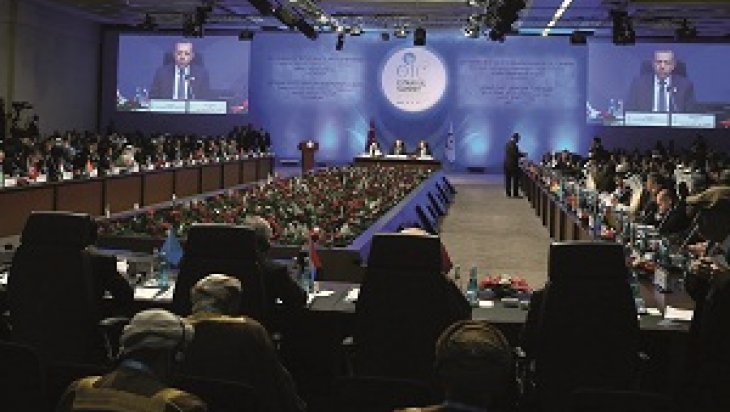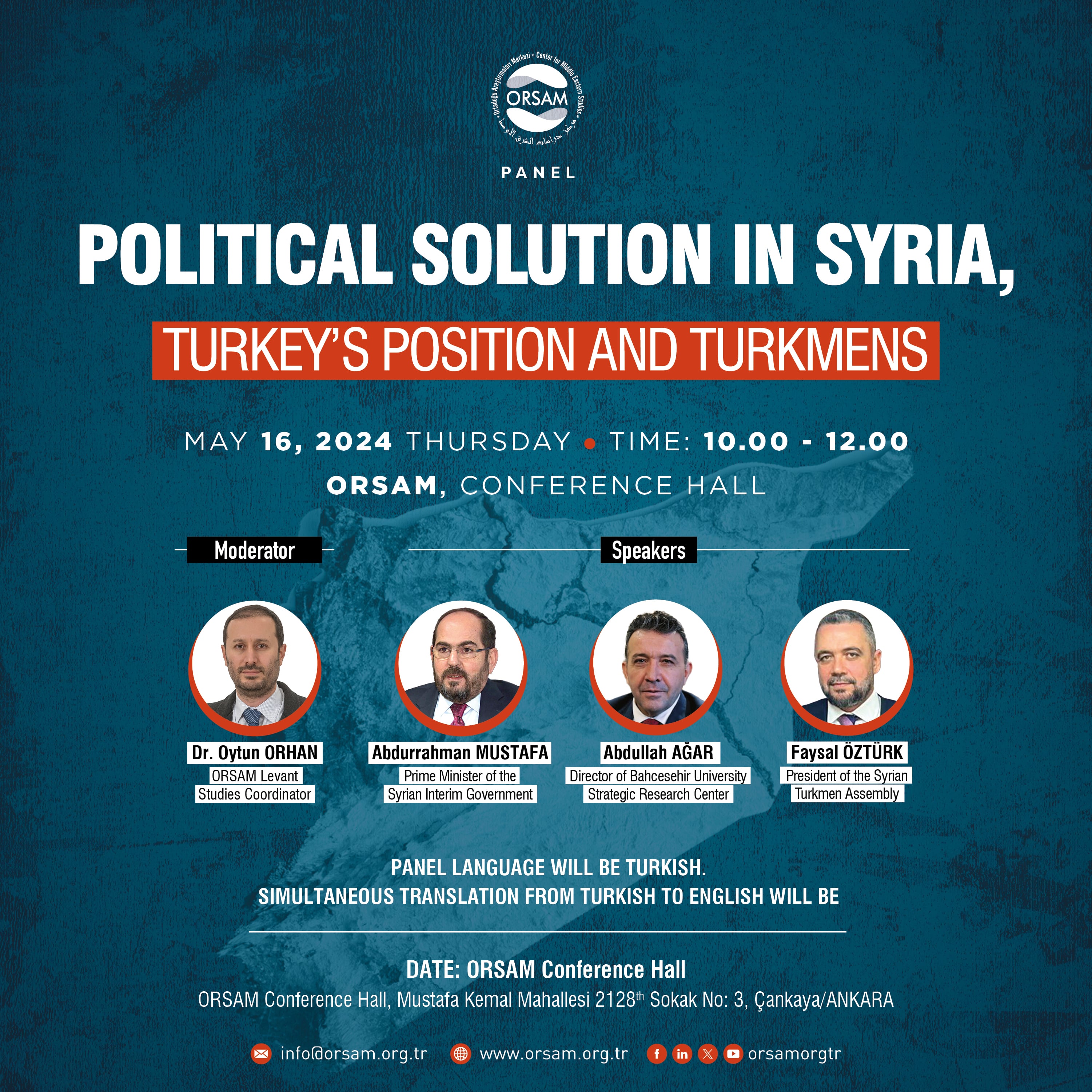The Summit of the Organization of Islamic Cooperation in Istanbul and Turkey’s Term Presidency

Iran was heavily criticized in the final declaration of the summit of Organization of Islamic Cooperation (OIC) held in Istanbul on 14-15 April 2016. This especially aroused the attention of all specialists who followed the summit. In this declaration, Tehran was accused of “intervening in the domestic affairs of such countries in the region as Bahrein, Yemen, Syria and Somalia”, “supporting terrorism” and “intervening in the domestic affairs of Saudi Arabia with its statements about the judicial decisions of the mentioned state.” The statement of “the relations between Islamic countries and Islamic Republic of Iran” in the 30th article of the declaration was very important, since it showed the current challenges of the organization, which was originally established to ensure unity among the Islamic states and to act together with the aim of finding a solution to the problems that Muslims encountered. It remains unknown whether the statement of “Islamic states and Iran” was written in the declaration by mistake or intentionally. However, this statement is very meaningful, since it shows the dimension of the fracture between the Sunni states and Iran, one of the most significant countries in the Islamic world. There have been speculations that Sunni states have formed ‘an Islamic Army’ against ‘Shiite Iran.’ In this sense, this statement which may imply that Iran is not among the Islamic states, has become one of the examples which ironically indicated that the Sunni-Shiite conflict, which causes the biggest fear in the Islamic world, has increasingly brewed.
In this sectarian-oriented competition where Iran and Saudi Arabia are the leading actors, the other Islamic states in the region have difficulties in taking positions and the conflict is deepened and becomes almost indispensable. Especially countries with a considerable Shiite population like Iraq, Lebanon, Bahrein and Yemen feel the pressure of this conflict more closely. Moreover, the delicate balances that have been established between the Sunni and the Shiite Muslims throughout the history are now disturbed in these countries. For instance, the president has not been elected for two years in Lebanon; Yemen has been drawn into a civil war which also witnesses sectarian-based interference from external sources. In Iraq, the Sunnis, who feel excluded from the system by the Shiite, tend towards the organizations like DAESH and al-Qaeda, while the Shiite that are also excluded by the Sunni minority power in Bahrein have maintained their uprising for years. In Europe, Catholics, Protestants and Orthodox leave aside their sectarian identity and gain political, economic and social benefits by acting in common under the roof of the European Union. However, sectarian identities increasingly cause more conflicts in the Islamic world, which clearly shows that the Organization of Islamic Cooperation is not successful.
The OIC was established in order to protect the holy places of Islam when a Jewish fanatic burned down Al-Aqsa Mosque in 1969 and was institutionalized in time so that the Islamic world could act in unity against all the threats posed against it. There are two reasons for the failure of this organization. First, it is of utmost importance to underline the disorder that the member states of the organization have in terms of interest perception. The leading countries of the OIC, especially Iran and Saudi Arabia, resort to power politics against the other side, instead of cooperation in order to protect their interests and both parties lose in such relations. These actors, which consider each other as sources of threat, instrumentalize the communities in their proximity by their sectarian and ethnical identities in the power struggles between themselves. In this way, a security dilemma emerges and the actors, which want to eliminate the threat that the other side poses, mainly resort to power politics with armament, alliances and interventionist methods. This power politics raises more security concerns.
The second reason why the OIC fails to achieve its objectives is that the member states are not powerful enough to lead the world politics but mostly develop reactional policies to those of the global actors. The leading member state of the organization (Indonesia) ranks the 15th in the world considering the Gross Domestic Product, the most important indicator of economic power. This shows that the OIC is far behind North America, Europe and Far East in terms of economic, military and diplomatic capacity. These deficiencies in power prevent them from cooperation that will allow them to have a voice in the international system. The USA and the EU consider such cooperation attempts as an uprising against the political system where they assume the role of setting an order. Therefore, they adopt a preventive attitude and intervene in the effective functioning of the associations among the Islamic states with different methods. As seen in the example of Turkey’s deep cooperation with its neighboring countries in the Middle East in the second half of the 2000s, Muslim countries can form associations that will make them more active in the international system. However, they have serious problems in terms of developing a strong resistance to the destructive policies of global and regional actors that are disturbed by these associations.
Will Turkey, which has assumed the OIC term presidency at the summit in Istanbul, have the chance to change the year-to-date course of events of the organization in general during its term until 2019? Will it be able to turn the OIC into an influential actor concerning the solution of the problems between Islamic countries? The most important point to take into consideration should be the extent to which Turkey will succeed in solving its own problems pertaining to domestic politics. One of the reasons why the OIC has failed to achieve its goals since 1969 is the lack of an influential actor which will lead and mediate within the organization when necessary. Therefore, it is important that one of the member states come to the forefront in this respect, in order to solve the problems with peaceful means and to strengthen the cooperation potential within the organization. If Turkey successfully addresses the challenges stemming from its own political system and enhances its stability, this will give Ankara the chance to effectively use the OIC term presidency to solve the abovementioned problems within the Islamic world.
It may seem impossible for Turkey to succeed in finding a common ground for 57 OIC member states. However, it should aim to build a consensus that will lead the institutional policies in such international organizations with high level of participation. Ankara should build consensus especially between Saudi Arabia and Iran in terms of Middle East policy. This should be among the priority issues during its term presidency in the OIC. What Turkey should do in order to play an influential role in building such consensus is enumerated as follows:
· If Turkey abstains from supporting one side as much as possible in the unfolding competitive environment between Tehran and Riyadh, this will allow Ankara to acceptably mediate between these two actors in order to solve the problems they have. It would be useful to remember that Turkey was a prominent and efficient intermediator, who which gained the confidence of all parties in terms of the solution to the problems in the Middle East during the second half of the 2000s. Therefore, it will be right for Ankara to make efforts to hold this mediatory position again by turning Ankara’s term presidency of the OIC into an opportunity.
· It will be beneficial for Turkey to receive support from the OIC member states like Indonesia, Malaysia and Algeria that have not directly taken any sides so that it can solve the problems between Saudi Arabia and Iran. Especially Indonesia has the potential to grow into a major power with its economy and population in Southern Asia, which allows this country to play an efficient role in the future of the Islamic world. If Turkey closely cooperates with the Islamic countries outside the Middle East, it will both keep away from being a part of the problems in the Middle East and make some partners that it will need in order to find solution to the problems in the region.
As the term president of the OIC, Turkey will also have some other problems to deal with. It is important to fight the religious radicalism which has almost spread to the entire Islamic world in the last period. This is needed for at least two reasons: to remove the instability which is the biggest obstacle in front of the economic and social development of the Islamic states and to allow the Islamic world to establish healthy relations with other civilizations. From this viewpoint, it should be underlined that the abovementioned struggle has two important dimensions. Firstly, necessary socio-economic, political and security measures should be taken under the roof of the OIC and the other international institutions that bring Islamic countries together in order to hinder the propagation of the takfirist movements, which impose their belief upon others and tend to use violence in the Islamic world. Secondly, it is also an important duty of the OIC to make intense efforts to remove the misperception of Islam in non-Muslim communities, especially the Western world. Within this framework, it is necessary to fight those who consciously promote Islamophobia in the mentioned non-Muslim communities and to protect Muslims living there from Islamophobia which rises especially in the Western world.
The OIC primarily needs to solve the problems among its own member states, with diplomacy and dialogue, so that it can fulfil these important duties that it is expected to. In this regard, important duties fall on Turkey which has just taken over the term presidency.
This article was published in Ortadoğu Analiz journal with the title of "The Summit of the Organization of Islamic Cooperation in Istanbul and Turkey’s Term Presidency”







